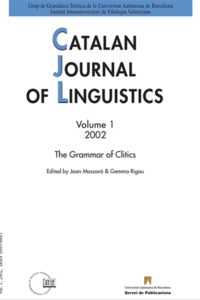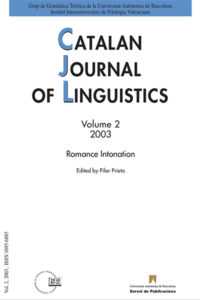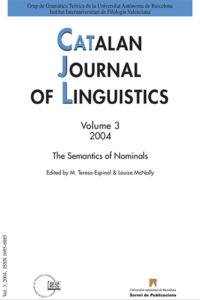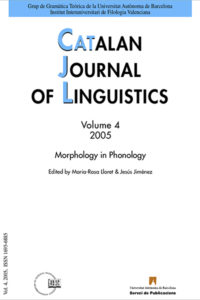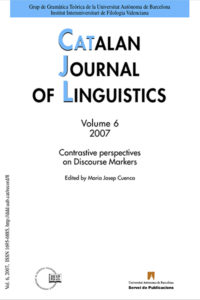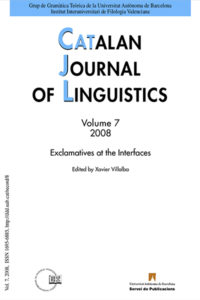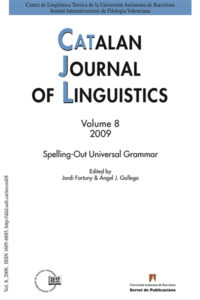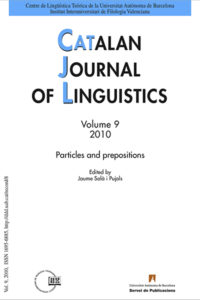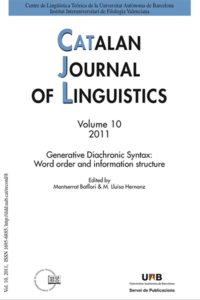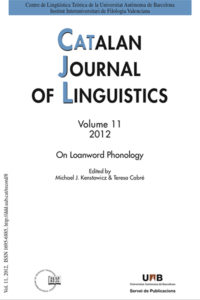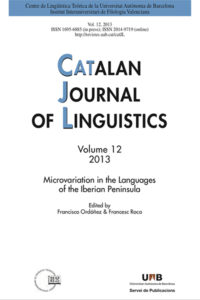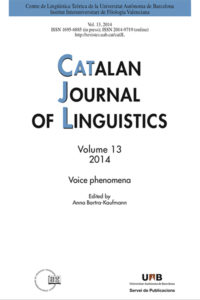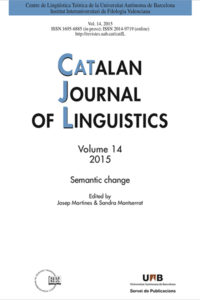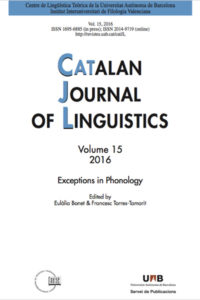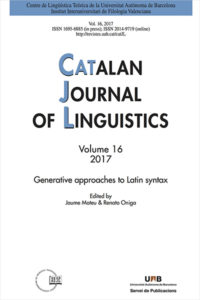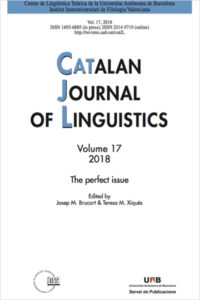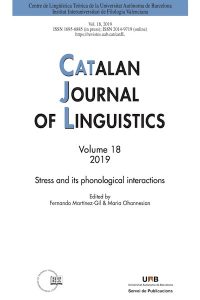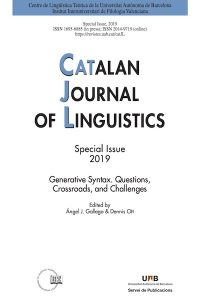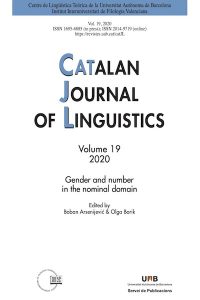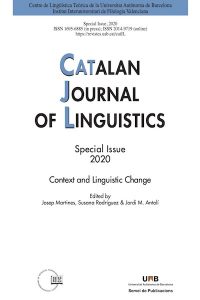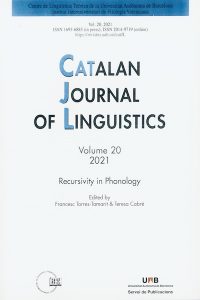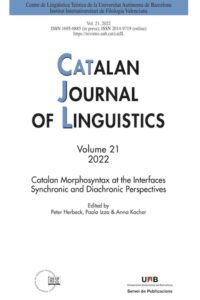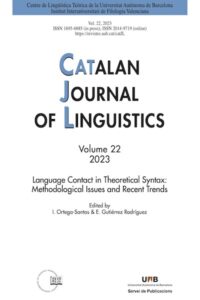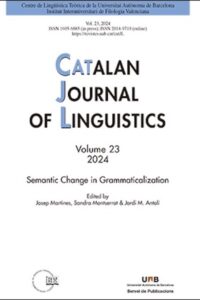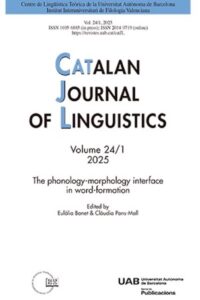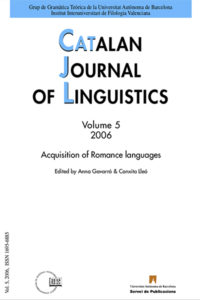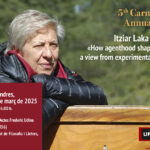25 maig, 2006
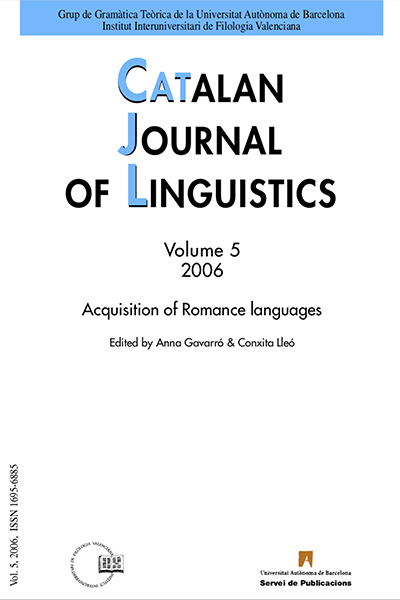
Autors:
Anna Gavarró & Conxita Lleó (eds.)
Títol:
Acquisition of Romance languagesEditorial: Universitat Autònoma de Barcelona, Servei de Publicacions
Col·lecció: Catalan Journal of Linguistics #05Data de publicació: 2006
Pàgines: 276 Text completGenerative grammar addressed for the first time acquisition as a central issue in the study of grammar. This perspective has given rise over the years to a considerable body of work, mainly on first language acquisition, but also on second language acquistion, bilingual acquisition, and the acquisition by children affected by SLI. If we assume continuity, i.e. that all stages in acquisition reflect possible natural languages, we must posit a mutual dependency between grammatical theory and the facts of acquisition. On the one hand, theories about particular languages should pass the proof against data from acquisition. On the other hand, acquisition data may provide a source of evidence for deciding among alternative theories of language.
Within the past twenty years, Romance languages have been an increasing focus of research for theories of language, and the literature on the acquisition of Romance has grown steadily during this time. The moment thus seemed ripe to unify the efforts of several scholars working on the acquisition of Romance languages and devote a special issue of CatJL to the acquisition of Romance, taking into consideration the double perspective just mentioned. We thank the authors and reviewers for making this project possible. The volume deals with the acquisition of the phonology, morphology and syntax in Catalan, French, Portuguese, Romanian and Spanish. The papers dealing with phonology focus on two main topics: the acquisition of prosodic constituents and the interface between phonology and morphology. The prosodic constituents examined are: the syllable (Demuth & Kehoe on consonant clusters in French; Prieto & Bosch Baliarda on codas in Catalan) and the foot (Goad & Buckley on the relevance of the foot in Québec French). The morpho-phonological interface is treated by Fikkert & Freitas (on the relevance of allophony and allomorphy for the acquisition of the Portuguese vowel system), and Lleó (on the dependence of plural marking on phonological acquisition). The papers dealing with syntax focus on the acquisition of pronominal clitics (Babyonyshev & Marin on clitic production in Romanian and Pirvulescu on clitic omission in French) and verb and wh- movement (Costa & Loureiro on verb raising in Portuguese, Hamann on wh- movement in French).
All the papers in this volume show the relevance of formal linguistics to issues in acquisition, focusing on the relationship between representation and acquisition from different perspectives and in different modules of the grammar.
Títols de la col·lecció / Also in this series:
28 febrer, 2025
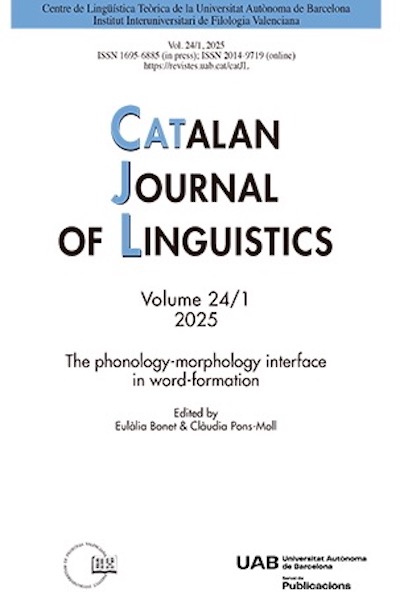
Autors:
E. Bonet & C. Pons-Moll
Títol:
The phonology-morphology interface in word-formationEditorial: Bellaterra: Servei de Publicacions de la UAB
Col·lecció: Catalan Journal of Linguistics #2025Data de publicació: 2025
Pàgines: 325 Més informació
Text completThis issue of Catalan Journal of Linguistics contains a selection of nine contribu-tions that were presented at the workshop “Nominal inflection and word-formation at the phonology-morphology interface” (NoWPhoMo), which took place in early 2024 at the Universitat de Barcelona (January 25) and at the Universitat Autònoma de Barcelona (January 26), as part of the coordinated research project Native and non-native phonology: Language contact effects and interaction with other com-ponents of grammar, PID2020-113971GB-C21 and PID2020-113971GB-C22. The edition of the volume was handled by project PID2020-113971GB-C22.
Títols de la col·lecció / Also in this series:
28 octubre, 2024
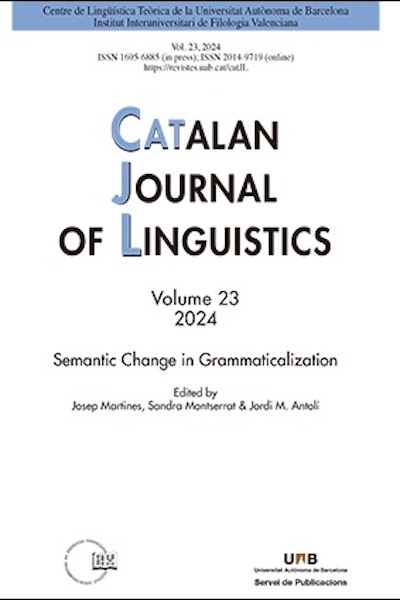
Autors:
J. Martines Peres, S. Montserrat Buendia & J. M. Antolí Martínez (eds.)
Títol:
Semantic Change in GrammaticalizationEditorial: Universitat Autònoma de Barcelona, Servei de Publicacions
Col·lecció: Catalan Journal of Linguistics #2024Data de publicació: 2024
Pàgines: 324 Més informacióIn recent decades, diachronic semantics as a discipline has undergone a revolu-tion. Firstly, because the very concept of meaning has been broadened: whereas traditionally diachronic semantics focused on the study of lexicon, it is now agreed that not only the lexicon is a bearer of meaning, but also morphemes, phraseologi-cal units or grammatical constructions contain a semantic load. Consequently, this expansion of the field of study has been accompanied by a re-evaluation of the dis-cipline: diachronic semantics has gone from being on the periphery of the study of linguistic change to being considered a core subject. The importance that semantic change has acquired in the study of grammaticalization is paradigmatic of all this: Semantics and Pragmatics have become fundamental disciplines for explaining the origin of grammatical change and the context in which it occurs.
At first, studies on grammaticalization (see, for example, Lehmann 1995) focused on the description of the criteria defining the change and the semantic, morphosyntactic and phonological patterns involved. In these early studies, the role given to semantic change was minor, and it was mainly observed that gram-maticalization entailed a loss of meaning (semantic bleaching) between the source units and the grammaticalized units.
In a second stage, studies such as those by Traugott (1989, 2010, among oth-ers), Traugott & König (1991), Hopper & Traugott (1993) or Traugott & Dasher (2002) placed semantics and pragmatics at the center of interest. Along with the semantic bleaching associated with grammaticalization processes, it was pointed out how grammaticalization also entails the encoding of pragmatic values in the new grammaticalized units that the source units did not possess.
Moreover, cognitivist and, more generally, usage-based approaches have offered new answers to a fundamental question about the process of grammati-calization: Why does change occur? Along with the well-known formal reasons (such as the power of analogy), in recent decades the importance of the discursive context in the initiation of these phenomena of change has been emphasized. To this end, the pragmatic analysis of concrete communicative contexts and the application of concepts such as bridging context and invited inference, which E. C. Traugott integrates in the Invited Inferencing Theory of Semantic Change (IITSC), are fun-damental. Grammaticalization, according to this theoretical framework, originates when the encoded meaning is enriched with pragmatic values that arise from con-crete communicative contexts as a result of invited inferences. The conventionaliza-tion of these new values, with the formal changes that this entails, opens the way to grammaticalization.
Within this context, this special issue explores the place of semantic change in grammaticalization and studies cases of grammatical change with a focus on semantic change. In this sense, a selection of studies is offered that combine works with a greater theoretical weight, which a) analyze the development of the concept of grammaticalization and the place attributed to semantic change, b) deal with the correlation between semantic change and other aspects of linguistic change (syntax, morphology, phonology) and c) analyze the intersection between grammaticalization and other patterns in linguistic change (phraseologization, constructionalization). These works of a theoretical nature are combined with case studies, mainly, but not only, focused on Romance languages (and specifically on Spanish and Catalan). These empirical studies are based, in all cases, on historical data from linguistic corpora or on interlinguistic comparison.
Títols de la col·lecció / Also in this series:
30 juny, 2023
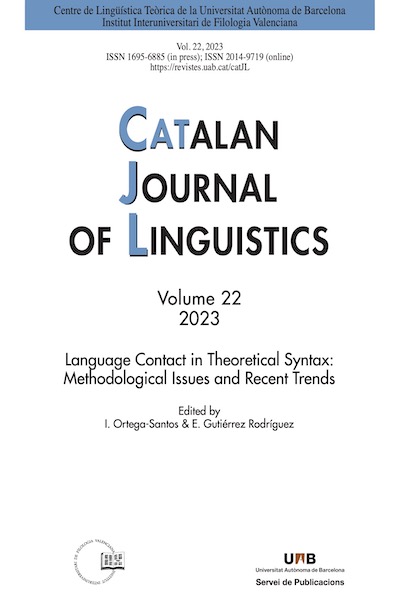
Autors:
I. Ortega-Santos & E. Gutiérrez Rodríguez (eds.)
Títol:
Language Contact in Theoretical Syntax: Methodological Issues and Recent TrendsEditorial: Universitat Autònoma de Barcelona, Servei de Publicacions
Col·lecció: Catalan Journal of Linguistics #2023Data de publicació: 2023
Pàgines: 148 Més informació
Text completWhile most syntactic research has naturally focused on varieties spoken by (supposedly) monolingual speakers, the study of language contact stands out as particularly relevant not only as celebration of linguistic diversity, but also from the theoretical point of view. For one thing, it expands the number of syntactic context available to test hypotheses by adding contact varieties and heritage languages as well as phenomena such as code-switching into the picture. Moreover, the study of language contact presents data collection challenges, which speak directly to ongoing debates on data collection standards in the field of syntax. In particular, there is an ongoing trend towards the adoption of experimental data collection methods and statistical analysis and/or the use of crowdsourcing and citizen science (e.g., see Gallego and Ortega-Santos 2019). Language-contact phenomena correspond to highly specific geolects/sociolects that are not necessarily spoken by the researchers. Thus, researchers are faced with the question of how to gather the data most efficiently and with generalizability; crucially, these issues are discussed explicitly in the corresponding publications, in contrast to most non-experimentalist or non-variationist syntactic research, thus helping the field of theoretical syntax as a whole adopt experimental data collection protocols. Furthermore, the study of language contact has figured prominently in the study of language change, with an emphasis on the extent to which language contact may cause syntactic changes – changes in the I-grammar, say, parameter resetting – and, if so, under what conditions (see Meisel et al. 2013 and references therein). Last but not least, this is also an area relevant to the study of external factors (e.g., language identity or language shift). As such, it lends itself to interdisciplinary work and hopefully crosspollination inthe study of the relationship between the grammar/competence and more usage-based notions such as frequency.
Títols de la col·lecció / Also in this series:
28 gener, 2021
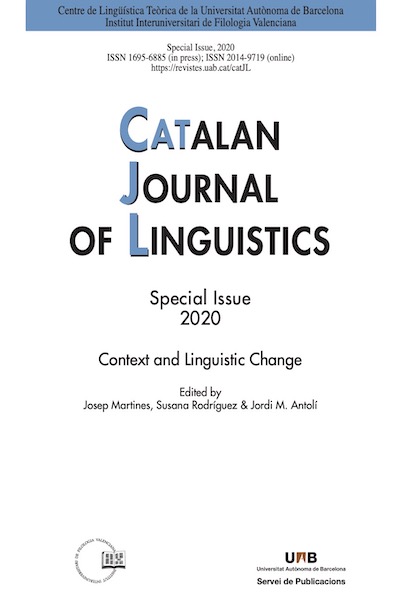
Autors:
Martines, Josep, Susana Rodríguez & Jordi M. Antolí (eds.)
Títol:
Context and Linguistic ChangeEditorial: Bellaterra: Servei de Publicacions de la UAB
Col·lecció: Catalan Journal of Linguistics #2020 SpecialData de publicació: 2020
Pàgines: 204 Text complet
The papers integrating this special issue aim at shedding light on the many research possibilities suggested by usage-based linguistics. All the contributions have different goals, focus on different languages (Catalan, English, Spanish or Portuguese), use several chronological frameworks (there are diachronic and synchronic analysis) and approach a variety of linguistic elements. However, despite this seeming heterogeneity, all the papers share a similar methodology and a conception of linguistic communication – and, specifically, of linguistic change – strongly based on usage.
Títols de la col·lecció / Also in this series:


